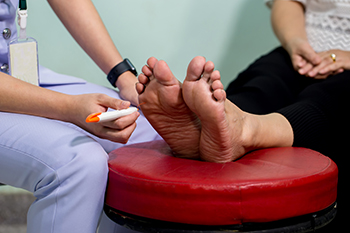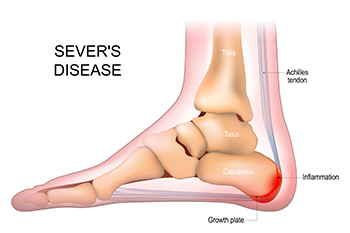Connect With Us
Blog
Items filtered by date: January 2024
The Link Between Increased Body Mass and Foot Discomfort

Exploring the correlation between elevated body mass and foot pain unveils a compelling relationship. Excess weight places additional stress on the feet, leading to discomfort and various conditions. The arches, heels, and joints bear the brunt of this burden, potentially resulting in ailments such as plantar fasciitis and osteoarthritis. The arch of the foot may collapse under the strain, causing pain and instability. Additionally, increased body mass may contribute to the degradation of joints, accelerating wear and tear. Overpronation, an inward rolling motion of the foot, becomes more prevalent, exacerbating discomfort. Recognizing this connection is pivotal for those grappling with foot pain, as shedding excess weight through a balanced diet and exercise regimen can significantly alleviate symptoms. If you are overweight and have foot pain, it is suggested that you confer with a podiatrist for treatment..
Obesity has become very problematic at this point in time and can have extremely negative effects on the feet. If you’re an obese individual and are concerned about your feet, contact one of our podiatrists from Advanced Ankle & Foot Care. Our practitioners can provide the care you need to keep you pain-free and on your feet.
Obesity and Your Feet
Since your feet are what support your entire weight when standing, any additional weight can result in pain and swelling. Being overweight is one of the main contributors to foot complications.
Problems & Complications
Extra Weight – Even putting on just a few extra pounds could create serious complications for your feet. As your weight increases, your balance and body will shift, creating new stresses on your feet. This uneven weight distribution can cause pain, even while doing the simplest tasks, such as walking.
Diabetes – People who are overweight are at serious risk of developing type-2 diabetes, which has a drastic impact on the health of your feet. As you get older, your diabetes might worsen, which could lead to loss of feeling in your feet, sores, and bruises. You could also become more prone to various infections.
Plantar fasciitis – Pressure and stress that is placed on muscles, joints, and tendons can trigger plantar fasciitis, which is an inflammation of tissue that forms along the bottom of the foot.
If you have any questions please feel free to contact our offices located in Parma, Cleveland, and Westlake, OH . We offer the newest diagnostic and treatment technologies for all your foot and ankle needs.
Understanding Neuropathy Symptoms in the Feet

Neuropathy, a condition that affects the peripheral nerves, can result in various symptoms, and often has a pronounced impact on the feet. Individuals experiencing neuropathy may encounter sensations of tingling, burning, or numbness in their lower extremities. These discomforting sensations can progress to sharp, stabbing pain, hindering mobility and diminishing overall quality of life. Loss of coordination and balance may also occur, elevating the risk of falls and injuries. Changes in skin texture and temperature, coupled with muscle weakness, are additional indicators of neuropathy. As the condition advances, individuals may develop foot deformities. Seeking medical attention when these signs arise is imperative to identify the underlying causes, which may include diabetes, infections, or autoimmune disorders. If you are experiencing symptoms of neuropathy in your feet, it is suggested that you visit a podiatrist who can accurately diagnose this condition and offer treatment methods.
Neuropathy
Neuropathy can be a potentially serious condition, especially if it is left undiagnosed. If you have any concerns that you may be experiencing nerve loss in your feet, consult with one of our podiatrists from Advanced Ankle & Foot Care. Our practitioners will assess your condition and provide you with quality foot and ankle treatment for neuropathy.
What Is Neuropathy?
Neuropathy is a condition that leads to damage to the nerves in the body. Peripheral neuropathy, or neuropathy that affects your peripheral nervous system, usually occurs in the feet. Neuropathy can be triggered by a number of different causes. Such causes include diabetes, infections, cancers, disorders, and toxic substances.
Symptoms of Neuropathy Include:
- Numbness
- Sensation loss
- Prickling and tingling sensations
- Throbbing, freezing, burning pains
- Muscle weakness
Those with diabetes are at serious risk due to being unable to feel an ulcer on their feet. Diabetics usually also suffer from poor blood circulation. This can lead to the wound not healing, infections occurring, and the limb may have to be amputated.
Treatment
To treat neuropathy in the foot, podiatrists will first diagnose the cause of the neuropathy. Figuring out the underlying cause of the neuropathy will allow the podiatrist to prescribe the best treatment, whether it be caused by diabetes, toxic substance exposure, infection, etc. If the nerve has not died, then it’s possible that sensation may be able to return to the foot.
Pain medication may be issued for pain. Electrical nerve stimulation can be used to stimulate nerves. If the neuropathy is caused from pressure on the nerves, then surgery may be necessary.
If you have any questions, please feel free to contact our offices located in Parma, Cleveland, and Westlake, OH . We offer the newest diagnostic and treatment technologies for all your foot care needs.
Wounds That Don't Heal Need to Be Checked
Foot Conditions Caused by Pregnancy

Pregnancy is a transformative journey, both physically and emotionally. While many anticipate changes in their bodies, some may not be aware of the potential foot conditions that can arise during this time. One common issue is edema, or swelling of the feet and ankles, which results from increased blood volume and the pressure on leg veins. This can cause discomfort, but it is often temporary. Another condition linked to pregnancy is flat feet. Hormonal changes during pregnancy can affect the ligaments in the feet, leading to a decrease in arch height. This can contribute to foot pain and discomfort. Additionally, weight gain can place added stress on the feet, often causing pain and fatigue. The expanding uterus may also shift the center of gravity, altering the gait and potentially causing problems like plantar fasciitis. Pregnancy can bring about various foot challenges, but with proper care, many of these issues can be managed or prevented. If you have developed any type of foot conditions during your pregnancy, it is suggested that you schedule an appointment with a podiatrist who can monitor any foot pain or discomfort you may be experiencing.
Pregnant women with swollen feet can be treated with a variety of different methods that are readily available. For more information about other cures for swollen feet during pregnancy, consult with one of our podiatrists from Advanced Ankle & Foot Care. Our practitioners will attend to all of your foot and ankle needs.
What Foot Problems Can Arise During Pregnancy?
One problem that can occur is overpronation, which occurs when the arch of the foot flattens and tends to roll inward. This can cause pain and discomfort in your heels while you’re walking or even just standing up, trying to support your baby.
Another problem is edema, or swelling in the extremities. This often affects the feet during pregnancy but tends to occur in the later stages.
How Can I Keep My Feet Healthy During Pregnancy?
- Wearing orthotics can provide extra support for the feet and help distribute weight evenly
- Minimize the amount of time spent walking barefoot
- Wear shoes with good arch support
- Wear shoes that allow for good circulation to the feet
- Elevate feet if you experience swelling
- Massage your feet
- Get regular, light exercise, such as walking, to promote blood circulation to the feet
If you have any questions please feel free to contact our offices located in Parma, Cleveland, and Westlake, OH . We offer the newest diagnostic and treatment technologies for all your foot and ankle needs.
Key Facts About Children’s Feet

Children's feet undergo remarkable changes and development throughout their early years, playing a pivotal role in their overall well-being. During infancy, a child's feet have a soft and pliable structure, gradually forming the arches over time. It is essential to allow infants to kick and stretch their feet freely, aiding in natural muscle development. As children begin to walk, usually around their 12 to 18 months, selecting proper footwear becomes critical. Shoes should provide ample support without constricting movement. Flat feet are common in toddlers, but arch development generally progresses with age. Regular observation is vital to detect any irregularities or signs of discomfort. Children's feet grow rapidly, necessitating regular shoe size checks and replacements. Additionally, fostering good hygiene practices, such as keeping toenails properly trimmed and addressing any foot pain promptly, contributes to the overall health and well-being of children's feet. If you notice any foot problems in your child, it is suggested that you visit a podiatrist who can perform an exam and determine the cause.
The health of a child’s feet is vital to their overall well-being. If you have any questions regarding foot health, contact one of our podiatrists of Advanced Ankle & Foot Care. Our practitioners can provide the care you need to keep you pain-free and on your feet.
Tips for Keeping Children's Feet Healthy
- Make sure their shoes fit properly
- Look for any signs of in-toeing or out-toeing
- Check to see if they have Clubfoot (condition that affects your child’s foot and ankle, twisting the heel and toes inward) which is one of the most common nonmajor birth defects.
- Lightly cover your baby’s feet (Tight covers may keep your baby from moving their feet freely, and could prevent normal development)
- Allow your toddler to go shoeless (Shoes can be restricting for a young child’s foot)
- Cut toenails straight across to avoid ingrown toenails
- Keep your child’s foot clean and dry
- Cover cuts and scrapes. Wash any scratches with soap and water and cover them with a bandage until they’ve healed.
If you have any questions, please feel free to contact our offices located in Parma, Cleveland, and Westlake, OH . We offer the newest diagnostic and treatment technologies for all your foot care needs.
Definition and Affected Population of Sever’s Disease

Sever's disease, a common but often misunderstood condition, is not truly a disease, but rather a growth-related heel pain that affects active children and adolescents. This condition, also known as calcaneal apophysitis, occurs when the growth plate at the back of the heel becomes inflamed due to repetitive stress and tension. Children between the ages of 8 and 15 are most susceptible to Sever's disease, as this is typically when their bones are rapidly growing. This growth spurt places extra stress on the heel's growth plate, especially in active children who participate in sports or activities that involve running and jumping. The hallmark symptom of Sever's disease is heel pain, often exacerbated by physical activity. This pain can be particularly bothersome during or after exercise. Understanding Sever's disease is essential for parents and young athletes, as it enables early recognition and appropriate management. If your active child has heel pain, it is suggested that you consult a podiatrist who can effectively diagnose and treat Sever’s disease.
Sever's disease often occurs in children and teens. If your child is experiencing foot or ankle pain, see one of our podiatrists from Advanced Ankle & Foot Care. Our practitioners can treat your child’s foot and ankle needs.
Sever’s Disease
Sever’s disease is also known as calcaneal apophysitis, which is a medical condition that causes heel pain I none or both feet. The disease is known to affect children between the ages of 8 and 14.
Sever’s disease occurs when part of the child’s heel known as the growth plate (calcaneal epiphysis) is attached to the Achilles tendon. This area can suffer injury when the muscles and tendons of the growing foot do not keep pace with bone growth. Therefore, the constant pain which one experiences at the back of the heel will make the child unable to put any weight on the heel. The child is then forced to walk on their toes.
Symptoms
Acute pain – Pain associated with Sever’s disease is usually felt in the heel when the child engages in physical activity such as walking, jumping and or running.
Highly active – Children who are very active are among the most susceptible in experiencing Sever’s disease, because of the stress and tension placed on their feet.
If you have any questions, please feel free to contact our offices located in Parma, Cleveland, and Westlake, OH . We offer the newest diagnostic and treatment technologies for all your foot and ankle injuries.



